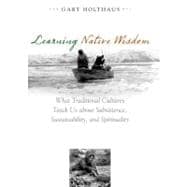
What is included with this book?
| "Axe Handles," Gary Snyder | p. 1 |
| Introduction: Why Subsistence, Sustainability, and Spirituality? | p. 3 |
| Back to Basics | |
| Music and Story | p. 15 |
| Habitat for a Sustainable Culture | p. 38 |
| Functional Cultures and Structural Cultures | p. 50 |
| Subsistence | |
| Exploring Subsistence | p. 67 |
| Education for Subsistence | p. 84 |
| Sustainability | |
| Education for Sustainability | p. 99 |
| Imagining Sustainability | p. 111 |
| Defining Sustainability | p. 122 |
| Stories for Sustainability | p. 130 |
| Spirituality | |
| The Power and Pragmatism of Language | p. 153 |
| Rectifying the Names | p. 174 |
| A Spirituality for Our Time | p. 189 |
| Conclusion: Creating a Sustainable Culture | p. 219 |
| "For Those Who Love Nature," in collaboration with C. J. Taylor | p. 229 |
| Acknowledgments | p. 232 |
| Notes | p. 237 |
| Bibliography | p. 246 |
| Index | p. 252 |
| Table of Contents provided by Ingram. All Rights Reserved. |
The New copy of this book will include any supplemental materials advertised. Please check the title of the book to determine if it should include any access cards, study guides, lab manuals, CDs, etc.
The Used, Rental and eBook copies of this book are not guaranteed to include any supplemental materials. Typically, only the book itself is included. This is true even if the title states it includes any access cards, study guides, lab manuals, CDs, etc.